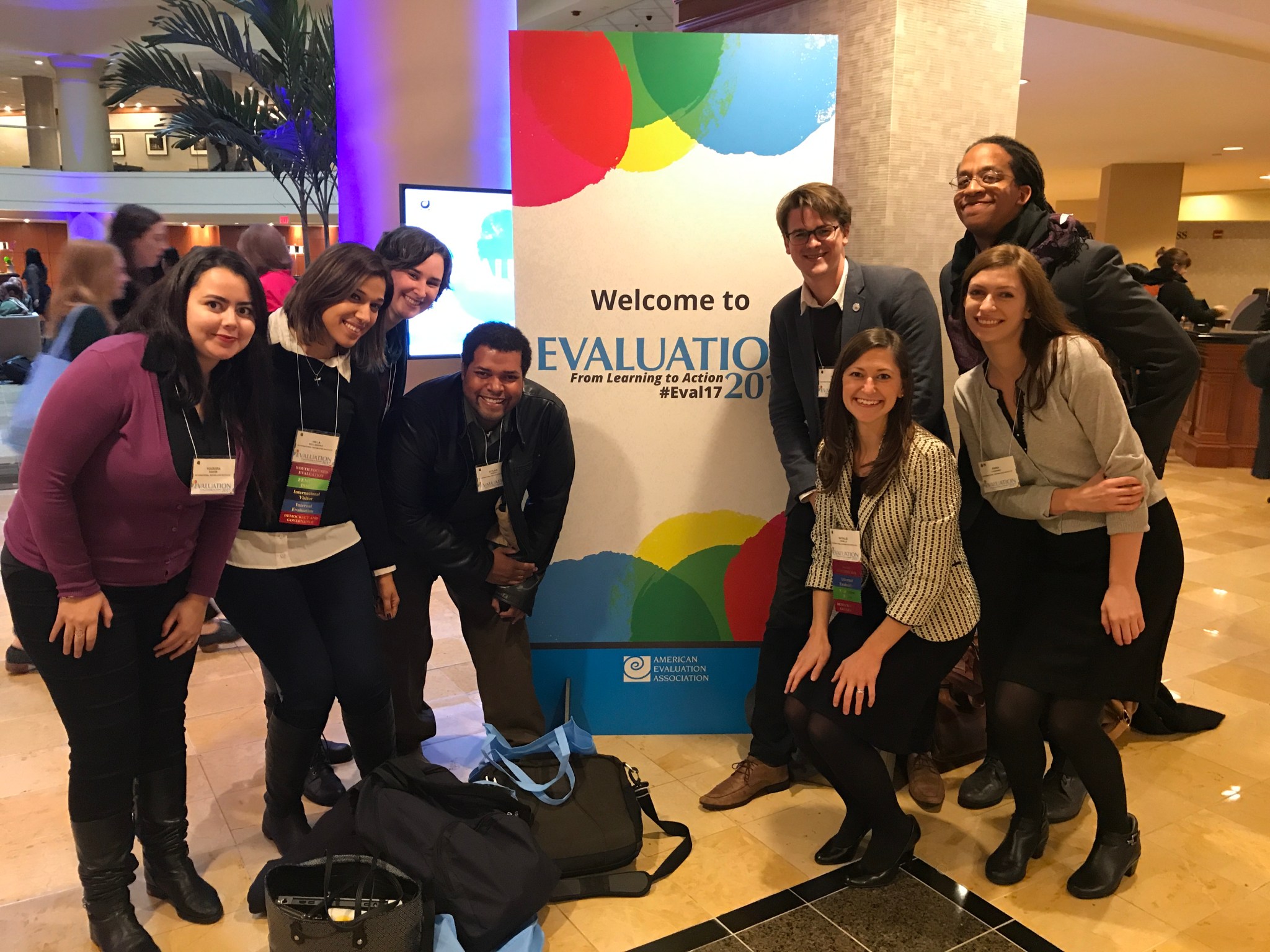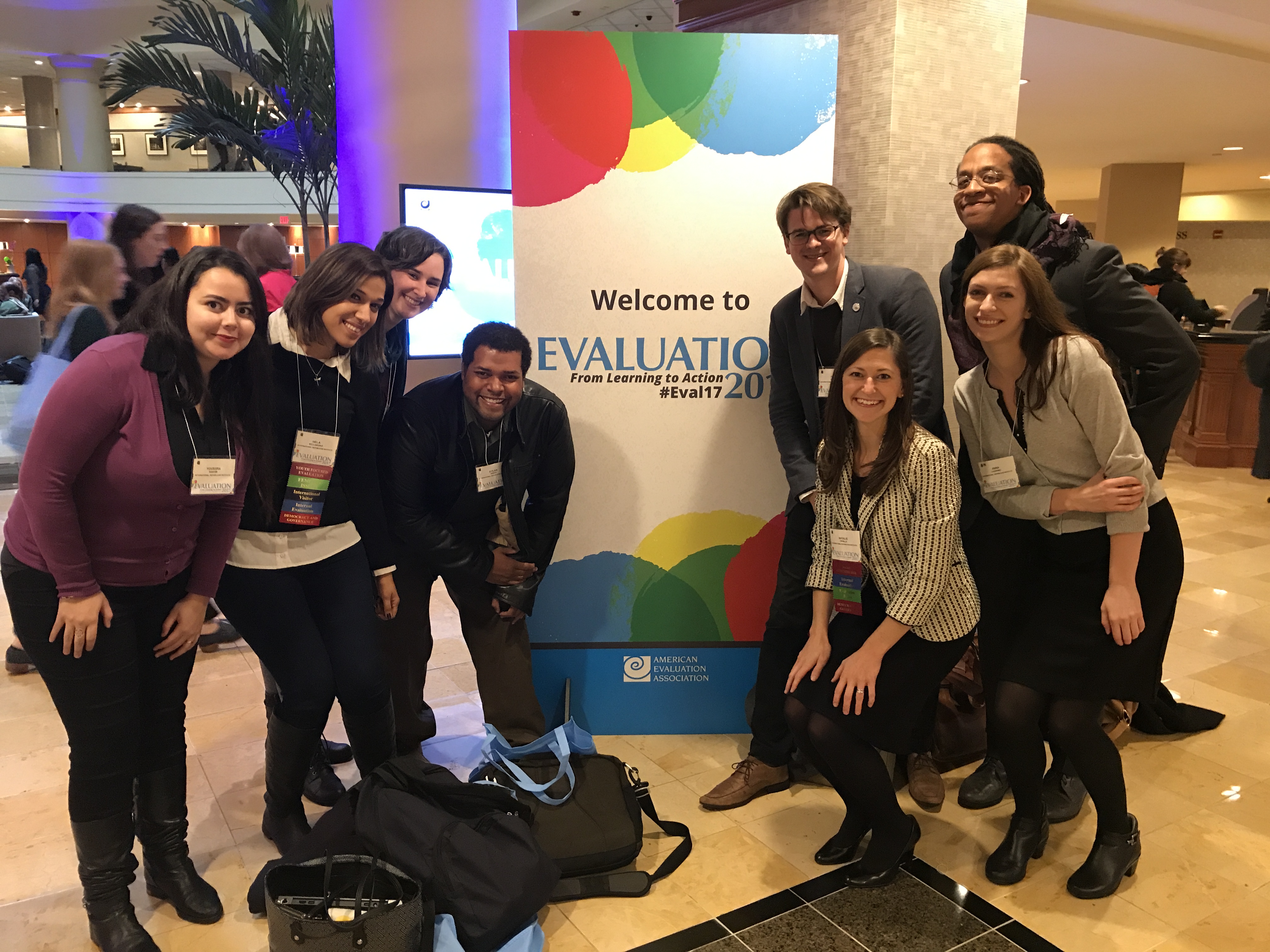
Last week, IRI joined more than 4,000 evaluators, academics, international development practitioners and evaluation users from around the world at the 31st annual American Evaluation Association conference in Washington. The theme of this year’s conference was “From Learning to Action,” which emphasized the need for continuous learning, from and with each other, to address modern-day challenges and improve our programs.
The conference included hundreds (literally!) of workshops and presentations on the latest trends, technology, tools and practices that can enhance learning. These eight takeaways sum up our higher-level learnings from the impressive line-up of conference sessions:
- You must make time for learning- it doesn’t just happen
While most organizations, leaders and teams acknowledge the need for learning, setting aside regular time for reflection is essential. Whether it’s regular “after action” reviews, learning workshops or simply dedicating a few minutes during team meetings for reflection, these structures help make learning a reality.
- Formalization matters: Processes need to be formalized to be performed consistently
To make monitoring, evaluation and program adaptation effective we need to be rigorous and consistent. While informal processes are a start, formalizing these systems ensures that we are consistent in our processes, and have valid and reliable data to inform our work.
- Structures are important: Organizational, reporting and funding structures can either promote or discourage learning
Rigid management and project structures reinforce siloes. While organizational change doesn’t happen overnight, championing vertical and horizontal collaboration and information sharing, and ultimately less rigid organizational and programmatic divides, is vital to ensuring that we adapt quickly and have the biggest impact.
- Contextual monitoring is key to understanding and adapting in complex, dynamic environments in which we work
Learning about the context of where we implement our interventions is not a one-time event. It requires a continuous process of monitoring the ever-changing environment. This enables us not only to react to changes but proactively anticipate them and plan our responses accordingly. Utilizing flexible but systematic tools such as scenario planning, frequent contextual scans, and adaptive management practices can help us learn and adapt quickly.
- Sometimes it’s about the process, not outcomes
We set ambitious goals for our work of empowering communities, strengthening democratic values, and ensuring that marginalized citizens are included in political processes, but the outcomes of our programs rely on long-term engagement and often do not appear overnight. Sometimes, it is the process itself that matters. Being intentional about who we bring to table during our interventions and evaluations can help to bridge divides, decrease mistrust and misunderstanding and lay a foundation for impact.
- Learning needs to be inclusive
We can’t, and shouldn’t, learn alone. Learning with and from communities we are trying to affect is key, and requires inclusive and honest dialogues with those whose voices are not usually heard. A representative democracy must include the voices of all citizens, and thus we need to target marginalized communities in our programming as well as develop inclusive M&E tools that demonstrate how our work affects their involvement in political and civic life.
- Participatory methods are key to understanding the effect of our work
Participatory tools give a stronger voice to our beneficiaries in the evaluation process. Some examples of these methods include outcome harvesting, ripple effect mapping (REM), and most significant change. These participatory methods enable us to interact with beneficiaries to capture rich stories and investigate causal links to change. Without participatory methods, we risk missing out on both important results and the context needed to better understand those results.
- Foster evaluative thinking throughout organizational processes to benefit future programming and encourage adaptation
Often the hardest thing about learning is to change our mindsets. It is essential to cultivate evaluative thinking among ourselves and our partners to think critically about how to design and implement effective programs, how to identify signs of success and how to recognize the need for adaptation. Without embracing evaluative thinking, even the most cutting-edge M&E is limited in its benefits to the program or its beneficiaries.
The conference highlighted how much progress we at IRI have already made on this learning journey: from incorporating adaptive management practices in our programs, conducting political economy analyses to keep up with the contextual complexity, developing flexible tools for implementing and evaluating programs in difficult political environments, to bringing marginalized communities to the discussion table.
The conference also allowed us to share the lessons we learned with the broader evaluation and international development community, and continue to solidify partnerships with our peers. Stay tuned for a coming blog post that details what we shared at AEA!

Top